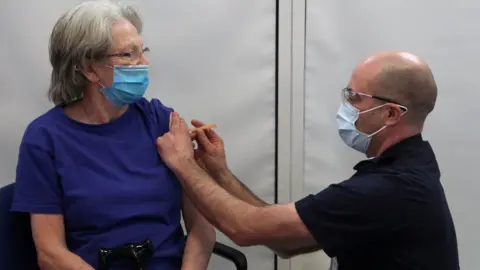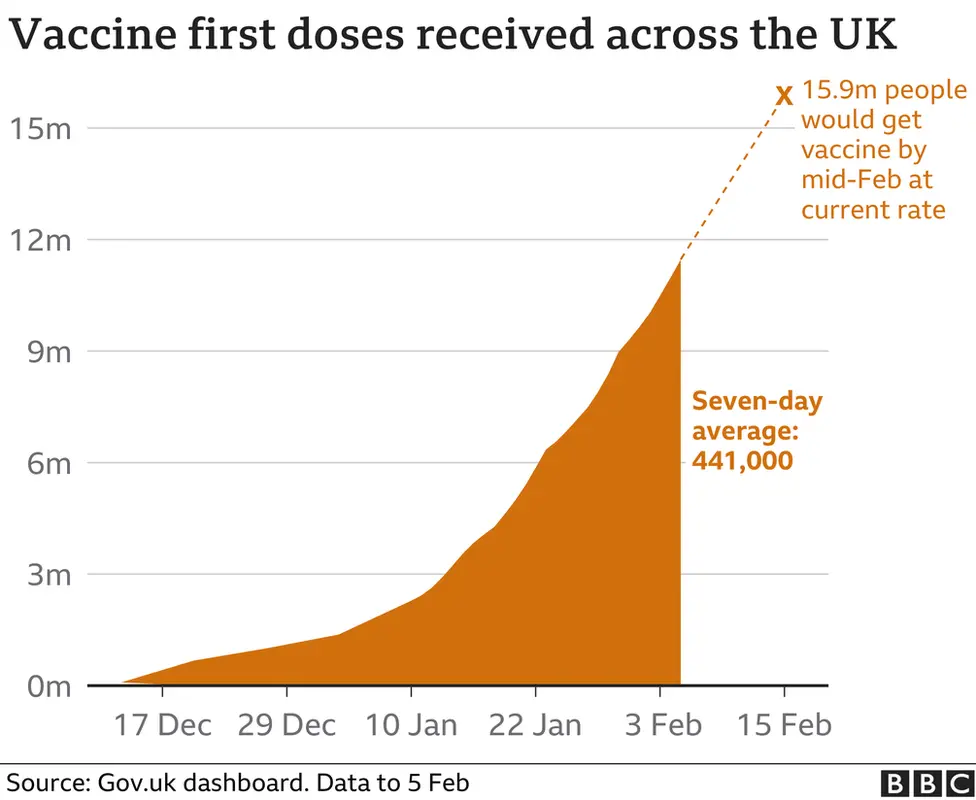Coronavirus: Vaccine chief 'optimistic' about over-50s May target
 Reuters
ReutersThe UK can meet the target of vaccinating all over-50s by May, the chairman of the vaccines taskforce has said, adding he is "very optimistic".
Dr Clive Dix told the BBC the taskforce has met every target set.
The UK would be "ahead of the game" in terms of anticipating variants of coronavirus and was making "libraries of future vaccines", he said.
He added that the UK would not hoard supplies but would distribute them globally, once the UK target is met.
Downing Street has said everyone in the UK aged 50 and over should have been offered a coronavirus vaccine by May.
Previously, ministers had said it was their "ambition" to vaccinate the first nine priority groups by the spring.
As of Friday, the UK had given a first jab to nearly 11.5 million people and is aiming to reach 15 million vaccinations by 15 February.
The latest figures also showed another 828 people in the UK have died within 28 days of a positive Covid test, and there were a further 18,262 cases.
Dr Dix, who heads the government unit charged with developing and producing vaccines, told BBC Radio 4's Today programme: "We will work day and night to ensure we meet whatever the target that's feasible can be met.
"So I'm very optimistic that we will meet the May target."
Questions have been raised around the efficacy of vaccines against variants of the virus - including the one first identified in Kent.
On Friday, Oxford-AstraZeneca said its vaccine gave people good protection against the UK variant.
Variants in South Africa and Brazil have also been identified.
Dr Dix, who is also chief executive of drug discovery company C4X Discovery, said the UK was "at the forefront of surveying" the variants, allowing scientists to "second-guess" mutations that have not yet occurred.
They can then make vaccines for those variants, he told the programme.
"We'll make libraries of future vaccines, just small amounts, enough to then, if it does occur, do a quick clinical study to see that it works and then start manufacturing it," he said.


Hitting this target is all about vaccine supply

The NHS has the staff, the volunteers and the clinics needed to vaccinate the 15 million in these next priority groups as well as give second doses to those who have already had their first jab.
But vaccine production is a biological process so there are no guarantees about how much can be grown.
However, there is growing confidence in the UK supply chain.
The bulk of the supplies are now coming from UK-based plants producing the Oxford-AstraZeneca vaccine and the yields from these are now consistently in line with expectation unlike those in Europe which started producing the vaccine later and have had less time to iron out the teething problems.
On top of this, supplies from Pfizer-BioNTech are expected to increase from mid-February after a slowdown in recent weeks.
There will also be a third vaccine made by US firm Moderna to help. The first batches of the 17 million ordered will start arriving before Easter.
It will all be needed as there can be no let up if the over-50s are to get vaccinated in the timeframe set out.

Asked whether there could be a vaccine-busting variant at some stage, Dr Dix said: "There's a possibility, but we'll be ahead of the game, we're not going to be waiting for it to happen.
"We now have the capabilities in the UK to be responsive and that capability won't just be for the use of the UK of course.
"Once we've done it, it will actually help the whole world because it will be part of that whole surveillance and reaction."
Speaking to BBC Breakfast, former Health Secretary Jeremy Hunt warned that mutations of the virus could lead to a "cycle" of lockdowns in the future if measures were not put in place, such as effective contact tracing.
"The worry that we have to really plan for is the possibility that we will have a new mutation that is actually immune to the vaccines that we're giving out at the moment," Mr Hunt said.
"So, in order to make sure that we don't get caught out by that again, we need to get transmission levels down to the kind of levels where we can do incredibly thorough contact tracing, like they do in Korea and Taiwan."
He also repeated his call for the government to consider more financial support for people told to self-isolate by NHS contact tracers, for example by offering to "make up any salary losses".
Despite the promising news over vaccines, doctors have warned against relaxing rules too quickly.
Dr Daniele Bryden, a consultant in intensive care medicine at Sheffield Teaching Hospitals, told Today: "I think the vaccination is really encouraging, but we really can't let our guard down and relax the rules.
"For example, the average age of a patient on intensive care at the moment is only 60 and 40% of people on intensive care are less than that age. So it's going to take some time before we see the impact of vaccination."


- TESTING: How do I get a virus test?
- SYMPTOMS: What are they and how to guard against them?
- LOOK-UP TOOL: How many cases in your area?
- GLOBAL SPREAD: How many worldwide cases are there?

Every adult in the UK will be offered a vaccine by the autumn, Health Secretary Matt Hancock said last month.
Meanwhile, surge testing is being rolled out to further areas to control and suppress the spread of coronavirus variants, including in:
- targeted areas around Worcestershire
- an area in Sefton, Merseyside (PR9)
- and areas in Bristol and South Gloucestershire
The Department for Health and Social Care said people living in targeted areas were "strongly encouraged" to take a Covid test this week, whether showing symptoms or not.
Testing for the South African variant is also due to be increased in Southport after a second case was detected.



Have you been affected by any issues relating to the vaccine rollout? Email [email protected].
Please include a contact number if you are willing to speak to a BBC journalist. You can also get in touch in the following ways:
- WhatsApp: +44 7756 165803
- Tweet: @BBC_HaveYourSay
- You can also upload your video or pictures.
- Please read our terms & conditions and privacy policy
Or please use the form below:
If you are reading this page and can't see the form you will need to visit the mobile version of the BBC website to submit your question or comment or you can email us at [email protected]. Please include your name, age and location with any submission.
